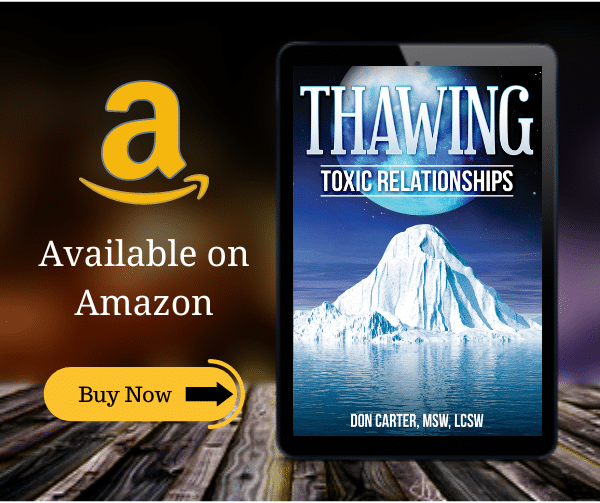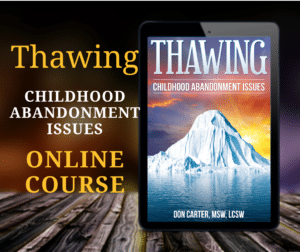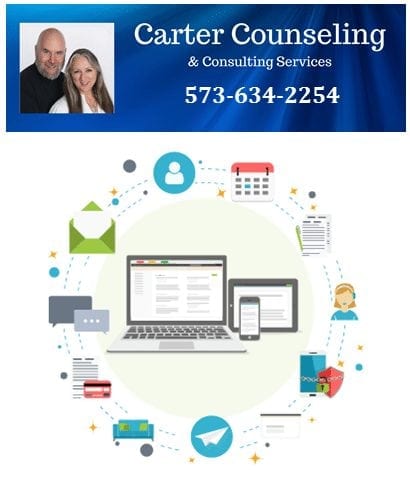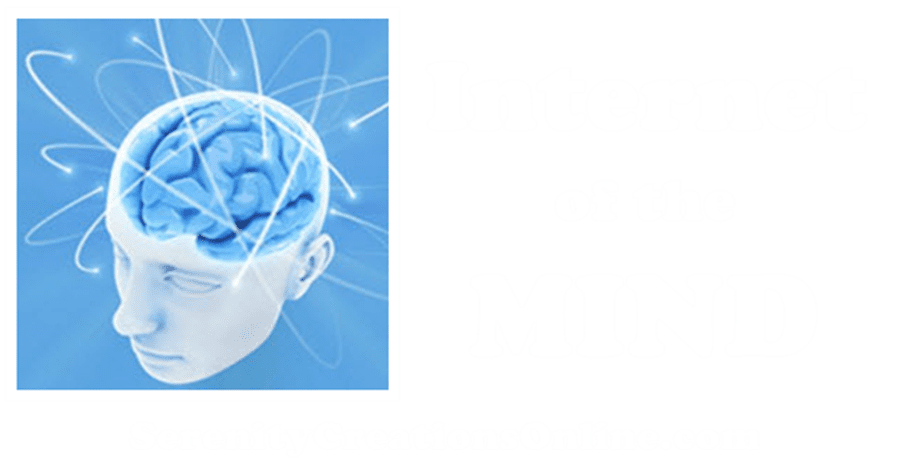
Healthy Relationship Stages

Healthy relationship stages follow a predictable developmental process. It is important to remember that whether or not the relationship fully develops depends on the investment of each partner – it doesn’t “just happen”. In fact, most relationships don’t make it to the final stage and very few make it to the third stage. According to divorce statistics, less than half make it out of the second stage. Healthy Relationships take work.
Stages of a Healthy Relationship
Human growth and development occurs in stages – We refer to them as developmental stages. There are developmental stages for every important aspect of being human:
- Stages of Childhood
- Stages of Adolescence
- General Life Stages
- Stages of a Healthy Relationship
We use these stages as a compass to mark where we are in the process of growth. We can also have some idea of what to expect… or what’s “normal” in a healthy relationship for a specific stage of growth. You may be interested to know that each of the developmental processes listed above fit into stages of one specific, predictable, and recurring developmental process… They are “stages-within-stages” if you will. These higher-level stages are:
-
Healthy Codependence
- Childhood – Infancy, co-dependent with mother during infancy.
- Adolescence – Individuation, co-dependent with a peer group or a romantic involvement.
- General Life Stages – Generally codependent during childhood
- Long-Term Relationship Stages – Healthy Codependence during courtship
-
Healthy Counter-Dependence
- Childhood – Toddler, counter-dependent… “terrible two’s”.
- Adolescence – Separation, counter-dependent with family
- General Life Stages – Generally counter-dependent during adolescence years
- Long-Term Relationship Stages – Healthy counter-dependence during Disillusionment & Conflict stage
-
Independence
- Childhood – Pre-school, more able to play away from mother.
- Adolescence – Rebellion, helps break childhood bonds
- General Life Stages – Young adulthood, out on their own
- Long-Term Relationship Stages – My Life, Your Life, Our life…Stops blaming spouse having established healthy boundaries
-
Interdependence
- Childhood – School-aged, getting along with peers and learning how to be part of a group
- Adolescence – Cooperation, begins to cooperate with the world by working together with others to reach personal goals.
- General Life Stages – Middle Adulthood to Wisdom
- Long-Term Relationship Stages – Intimacy, can finish each other’s sentences while maintaining sense-of-self
Below is a chart summarizing how these developmental processes fit together… Each period of life represents the degree of separation one is able to establish… each developmental period is also an opportunity to rework separation issues from the previous period.
If a child is not allowed to establish enough separateness by the end of the infancy period it sets the stage for unhealthy codependency in all the other stages. If a child is not allowed to establish enough separation by the end of the toddler stage it can lead to problems with unhealthy counter-dependency in all the other stages.
Externalizer is another term for unhealthy Counter-dependent.
Internalizer is another term for unhealthy Codependent.
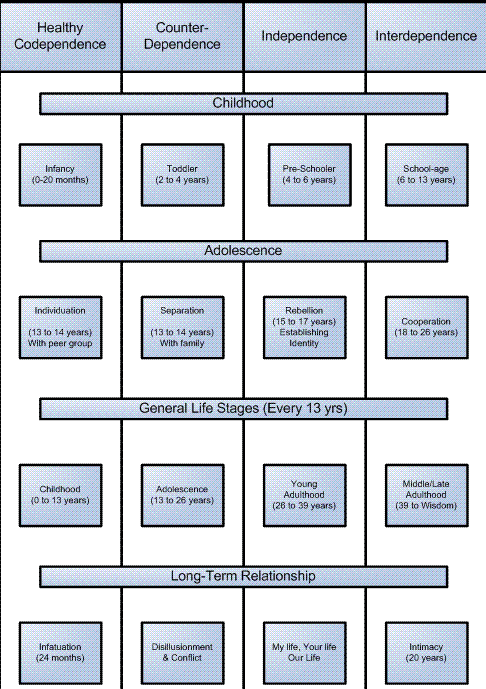
Understanding and navigating these stages can be incredibly empowering. It equips you with the tools to handle the highs and lows, ensuring that both partners grow individually and together.
The Four Key Stages of Healthy Relationship Development
Understanding the stages of relationship development is essential. It provides insights into navigating through each phase, ensuring a healthy and lasting partnership. These stages are predictable, much like human growth stages, and recognizing them can help couples grow together rather than apart.
Stage 1: Infatuation
Ah, the infatuation stage! This is where everything feels just right. It’s often referred to as the honeymoon period because it’s characterized by intense emotions, excitement, and an almost perfect view of your partner.
Characteristics of the Infatuation Stage
1. Idealization:
- During this stage, partners tend to focus on each other’s positive attributes.
- Flaws are either ignored or seen as charming quirks.
2. Intense Emotional Highs:
- Feelings of euphoria and exhilaration are common.
- Every moment spent together feels special and magical.
3. Frequent Communication:
- Constant texting, calling, or spending time together.
- Partners are eager to learn everything about each other.
4. Physical Attraction:
- A strong physical attraction is often at its peak.
- Touch and affection play significant roles.
5. Optimism About the Future:
- Couples make plans and dream about their future together.
- There’s a sense that nothing could go wrong.
John Bradshaw described this stage as a time when “chemicals like dopamine and oxytocin flood our brains,” creating feelings of pleasure and attachment.
Potential Pitfalls in the Infatuation Stage
While this stage is delightful, it’s important to navigate it wisely to avoid potential pitfalls:
- Unrealistic Expectations: Believing that your partner is flawless can lead to disappointment later when reality sets in.
- Ignoring Red Flags: Overlooking significant issues or differences can cause bigger problems in the subsequent stages.
- Overdependence: Relying too heavily on your partner for happiness can create an unhealthy dynamic.
- Neglecting Other Relationships: Friends and family might feel sidelined during this period; maintaining those connections is crucial.
To transition smoothly into the next stage, it’s essential to balance these intense feelings with realistic views about your partner and relationship. This ensures a foundation for growth rather than setting up for disillusionment later on.
In summary, while the infatuation stage is filled with joy and excitement, recognizing its transient nature helps in preparing for the challenges ahead. This awareness fosters a healthier outlook on relationships, preventing potential fallout as couples move into Stage 2: Disillusionment & Conflict.
Stage 2: Disillusionment & Conflict
According to Predictable Relationship Stages, after the initial excitement of the infatuation stage wears off, couples often find themselves facing disillusionment and conflict. This is when reality kicks in and partners start noticing each other’s flaws and differences more clearly. It’s an important turning point in the development of a relationship, as highlighted by John Bradshaw’s model.
What Happens During This Stage?
Here are some common experiences during the disillusionment and conflict stage:
- Differences Become Apparent: The things that used to be cute or endearing about your partner may now start to bother you. For example, their spontaneity might now seem like irresponsibility.
- Expectations Clash: When your expectations don’t align with your partner’s actions, it can lead to disappointment. You might be seeking more emotional support while your partner values their independence.
- Routine Sets In: The initial excitement of being together starts to fade as you settle into a daily routine. Those spontaneous date nights might become less frequent, replaced by comfortable but predictable activities.
Common Challenges in This Stage
Here are some difficulties that couples often face during this stage:
- Communication Breakdowns: Misunderstandings can quickly escalate into major conflicts if they’re not addressed properly.
- Resentment Building: When issues aren’t resolved and needs aren’t met, resentment can start to grow between partners.
- Doubts About Compatibility: As differences become more noticeable, one or both partners might start questioning whether they’re truly compatible with each other.
How to Navigate This Stage
To navigate through the disillusionment and conflict stage successfully, it’s important to develop effective communication and problem-solving skills. Here are some strategies that can help:
1. Active Listening:
- Give your full attention to your partner when they’re speaking, without thinking about how you’ll respond.
- Repeat back what you’ve heard to make sure you understand correctly.
2. Expressing Needs Clearly:
- Use “I” statements to express your feelings without placing blame on your partner (e.g., “I feel neglected when you don’t spend time with me”).
- Be specific about what you need from your partner.
3. Conflict Resolution Techniques:
- If a discussion becomes too heated, take a break and come back to it later.
- Instead of trying to win arguments, focus on finding solutions that work for both of you.
- Look for areas where you can compromise.
4. Investing in the Relationship:
- Regularly check in with each other about how you’re feeling in the relationship.
- Make time for activities that strengthen your bond, such as going on dates or pursuing shared interests.
The Importance of Understanding This Stage
It’s important to remember that experiencing disillusionment and conflict is a normal part of the journey towards a healthy and fulfilling relationship. By recognizing these predictable stages, couples can approach this phase with patience and empathy.
Stage 3: Independence, AKA Establishing Boundaries
In every relationship, it’s important for each person to maintain their own identity. This stage is often called the “Establishing Boundaries” stage. During this time, partners start to understand and accept each other’s personal space, needs, and wants. “I have my life, you have your life, we have our life.”
Why Boundaries Matter
Having clear boundaries is key to a healthy relationship. Just like plants in a garden need their own space to grow, individuals in a relationship need freedom to pursue their interests and maintain their unique personalities. This article provides more insights into the importance of boundaries in relationships.
- Mutual Respect: Recognizing and honoring each other’s limits builds trust.
- Autonomy: Ensuring both parties can be themselves prevents feelings of suffocation or loss of identity.
Challenges in This Stage
Navigating this stage can be difficult. It’s common for partners to feel insecure when boundaries are set, seeing them as obstacles instead of guidelines for healthier interaction.
Some challenges include:
- Fear of Rejection: Worrying that setting boundaries might push the partner away.
- Conflict Avoidance: Hesitating to discuss boundaries due to fear of conflict.
- Miscommunication: Not understanding what each partner needs in terms of personal space.
Strategies for Successful Boundary Setting
To overcome these challenges, it’s important to communicate openly and empathetically.
1. Open Conversation:
- Use “I” statements to express needs without blaming the other person.
- Example: “I need some time alone after work to recharge.”
2. Active Listening:
- Pay attention to your partner’s needs and acknowledge their emotions.
- Example: “I understand you need time with your friends, and I support that.”
3. Compromise:
- Find a middle ground where both partners feel their needs are respected. This article on compromise provides valuable insights into the subject.
- Example: Agree on specific times for personal activities versus activities as a couple.
4. Reassurance:
- Continuously reassure each other of your commitment even when boundaries are set.
- Example: Regularly express affection and your desire to grow together.
According to John Bradshaw’s model of predictable relationship stages, establishing boundaries is crucial for long-term success. As partners invest in understanding and respecting these boundaries, they lay down a solid foundation for a stronger connection moving forward.
Boundaries aren’t about creating distance; they’re about creating a balanced environment where both individuals can thrive together. By recognizing the significance of this stage, couples can avoid common issues like resentment or emotional exhaustion. Additionally, this resource provides valuable insights into helping teenagers develop positive relationships by understanding and establishing boundaries early on.
Stage 4: Intimacy
The intimacy stage is when a relationship reaches a deeper level of connection, with stronger emotional and physical bonds. Here’s what characterizes this phase:
1. Emotional Intimacy
Couples start opening up about their deepest fears, hopes, and dreams. Being vulnerable becomes crucial as it allows partners to truly understand each other.
2. Physical Intimacy
It goes beyond just sexual activity and includes small gestures of affection like holding hands, hugging, and touching that reinforce the emotional bond between partners.
In this stage, trust and vulnerability are vital. Building a strong foundation requires:
- Open Communication: Honest conversations about feelings, needs, and boundaries.
- Mutual Respect: Acknowledging each other’s individuality while nurturing the relationship.
- Shared Experiences: Creating memories together through activities that both partners enjoy.
John Bradshaw’s model highlights four predictable relationship stages:
- Infatuation Stage: Where everything feels perfect.
- Disillusionment & Conflict: When reality sets in and conflicts arise.
- Independence & Establishing Boundaries: Defining individual identities within the partnership.
- Intimacy: Deepening emotional and physical connections.
Each stage presents unique dynamics, challenges, and opportunities:
- Infatuation: Excitement but potential for unrealistic expectations.
- Disillusionment & Conflict: Challenges with communication but opportunities for growth.
- Independence & Establishing Boundaries: Potential for misunderstandings but essential for mutual respect.
- Intimacy: Requires vulnerability but leads to profound connection.
The role of partner investment cannot be overstated in navigating these stages effectively. High partner investment often correlates with lower divorce rates, as couples who invest time and energy into understanding each other tend to build stronger relationships.
According to John Bradshaw, relationships evolve uniquely; however, recognizing these stages helps in anticipating shifts and preparing for them. The development time for reaching the intimacy stage varies widely among couples but typically occurs after significant experiences together have solidified trust and mutual respect.
Research indicates that couples who actively invest in their relationship during all stages are better equipped to handle transitions. This investment includes not just time but also emotional energy and willingness to work through challenges together.
The ultimate goal in the intimacy stage is a stable relationship where both partners feel secure enough to be their authentic selves while feeling deeply connected to each other.
Navigating Challenges in Different Relationship Stages
Every stage in a relationship brings its unique set of challenges. Recognizing these common difficulties and knowing how to handle them can make a significant difference in the long-term success and happiness of your partnership. Relationships, much like human growth stages, involve a developmental process that requires patience, commitment, and adaptability.
Stage 1: Infatuation
Common Difficulties:
- Over-Idealization: In the infatuation stage, partners often see each other through rose-colored glasses. This over-idealization can lead to unrealistic expectations.
- Neglecting Red Flags: The excitement can sometimes overshadow warning signs that might need addressing.
Navigating Successfully:
- Grounding Expectations: While enjoying the thrill, keep your expectations realistic. Remember that perfection is an illusion.
- Open Dialogue: Discuss your feelings openly with each other. Communication is key to identifying and addressing any red flags early on.
Stage 2: Disillusionment & Conflict
Common Difficulties:
- Emerging Differences: As reality sets in, differences in values, habits, or goals become more noticeable.
- Increased Conflict: Misunderstandings and disagreements are more frequent during this phase.
Navigating Successfully:
- Effective Communication: Practice active listening and empathy. Understand each other’s perspectives instead of just focusing on winning an argument.
- Problem-Solving Strategies: Develop constructive ways to resolve conflicts. This might include setting aside time for discussions or seeking couples therapy if needed.
Stage 3: Independence & Establishing Boundaries
Common Difficulties:
- Loss of Individuality: Finding a balance between togetherness and individuality can be challenging.
- Boundary Confusion: It’s easy to either set too rigid boundaries or none at all.
Navigating Successfully:
- Define Clear Boundaries: Discuss what is important for each person’s identity and space within the relationship.
- Respect Autonomy: Encourage each other to pursue personal interests and friendships outside the relationship. This fosters mutual respect and maintains a healthy sense of self.
Stage 4: Intimacy
Common Difficulties:
- Vulnerability Fears: Deepening intimacy requires vulnerability, which can be intimidating.
- Routine Monotony: As routines settle in, maintaining the excitement can be difficult.
Navigating Successfully:
- Build Trust Gradually: Share personal thoughts and feelings incrementally to build trust without overwhelming each other.
- Keep the Spark Alive: Regularly plan activities or date nights to break the routine and keep the connection vibrant.
Embracing Change and Adaptation
Relationships are dynamic, evolving entities that require continuous effort from both partners. Embracing change as a constant can significantly enhance your relationship’s resilience and depth.
Strategies for Embracing Change:
- Stay Curious: Never stop learning about your partner. Ask questions, show interest in their evolving thoughts and feelings.
- Adapt Together: Life circumstances change—jobs, health, family dynamics—and adapting together strengthens your bond.
- Growth Mindset: View challenges as opportunities for growth rather than threats to the relationship.
Key Takeaways:
- Accept that facing challenges is normal behavior in any developmental stage of a relationship.
- Approach each stage with a mindset geared towards mutual growth.
Creating an environment where both partners feel safe to evolve individually while growing closer together sets the foundation for a lasting, fulfilling relationship.
Conclusion
Understanding and navigating the ups and downs of healthy relationship stages plays a significant role in personal and mutual fulfillment. Every stage, from the intoxicating excitement of infatuation to the deep emotional connection of intimacy, offers unique opportunities for growth and learning.
Healthy relationships are not devoid of challenges. Instead, they thrive on the ability to confront and resolve conflicts, establish individual identities while maintaining a strong partnership, and deepen trust through vulnerability. Embracing this dynamic journey is essential.
Reflecting on your own relationship can be enlightening. Consider these questions:
- Which stage are we currently experiencing?
- What challenges are we facing, and how are we addressing them together?
- How can we continue to grow both individually and as a couple?
Applying insights from understanding relationship development can strengthen your bond. This involves actively working on communication, setting healthy boundaries, and fostering emotional intimacy.
Remember:
Relationships are not just about finding the right person but also about being the right partner.
Take time to appreciate the beautiful complexity of your relationship. Celebrate the highs, learn from the lows, and remain committed to growing together. The journey through these stages is what makes a relationship resilient and deeply fulfilling.


